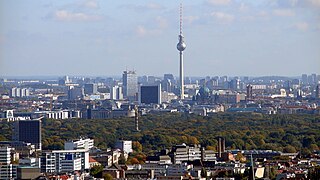| Men's freestyle light heavyweight at the Games of the XI Olympiad | |||||||||||||
|---|---|---|---|---|---|---|---|---|---|---|---|---|---|
| Venue | Deutschlandhalle | ||||||||||||
| Dates | 3–4 August | ||||||||||||
| Competitors | 12 from 12 nations | ||||||||||||
| Medalists | |||||||||||||
| |||||||||||||
| Wrestling at the 1936 Summer Olympics | |
|---|---|
 | |
| Greco-Roman | |
| Bantam | men |
| Feather | men |
| Light | men |
| Welter | men |
| Middle | men |
| Light heavy | men |
| Heavy | men |
| Freestyle | |
| Bantam | men |
| Feather | men |
| Light | men |
| Welter | men |
| Middle | men |
| Light heavy | men |
| Heavy | men |
The men's freestyle light heavyweight competition at the 1936 Summer Olympics in Berlin took place from 3 August to 4 August at the Deutschlandhalle. Nations were limited to one competitor. [1] [2] This weight class was limited to wrestlers weighing up to 87kg. [3]

The 1936 Summer Olympics, officially known as the Games of the XI Olympiad, was an international multi-sport event held in 1936 in Berlin, Nazi Germany. Berlin won the bid to host the Games over Barcelona, Spain, on 26 April 1931, at the 29th IOC Session in Barcelona. It marked the second and final time the International Olympic Committee gathered to vote in a city that was bidding to host those Games.

Berlin is the capital and largest city of Germany by both area and population. Its 3,748,148 (2018) inhabitants make it the second most populous city proper of the European Union after London. The city is one of Germany's 16 federal states. It is surrounded by the state of Brandenburg, and contiguous with its capital, Potsdam. The two cities are at the center of the Berlin-Brandenburg capital region, which is, with about six million inhabitants and an area of more than 30,000 km², Germany's third-largest metropolitan region after the Rhine-Ruhr and Rhine-Main regions.

Deutschlandhalle was an arena located in the Westend neighbourhood of Berlin, Germany. It was inaugurated on 29 November 1935 by Adolf Hitler. The building was granted landmark status in 1995, but on 3 December 2011 the building was demolished.
Contents
This freestyle wrestling competition continued to use the "bad points" elimination system introduced at the 1928 Summer Olympics for Greco-Roman and at the 1932 Summer Olympics for freestyle wrestling, with a slight modification. Each round featured all wrestlers pairing off and wrestling one bout (with one wrestler having a bye if there were an odd number). The loser received 3 points if the loss was by fall or unanimous decision and 2 points if the decision was 2-1 (this was the modification from prior years, where all losses were 3 points). The winner received 1 point if the win was by decision and 0 points if the win was by fall. At the end of each round, any wrestler with at least 5 points was eliminated. [3]

Freestyle wrestling is a style of amateur wrestling that is practiced throughout the world. Along with Greco-Roman, it is one of the two styles of wrestling contested in the Olympic games. American high school and college wrestling is conducted under different rules and is termed scholastic and collegiate wrestling.

The 1928 Summer Olympics, officially known as the Games of the IX Olympiad, was an international multi-sport event that was celebrated from 28 July to 12 August 1928 in Amsterdam, Netherlands. The city of Amsterdam had previously bid for the 1920 and 1924 Olympic Games, but was obliged to give way to war-torn Antwerp in Belgium for the 1920 Games and Pierre de Coubertin's Paris for the 1924 Games.

The 1932 Summer Olympics, officially known as the Games of the X Olympiad, was an international multi-sport event that was held from July 30 to August 14, 1932, in Los Angeles, California, United States.